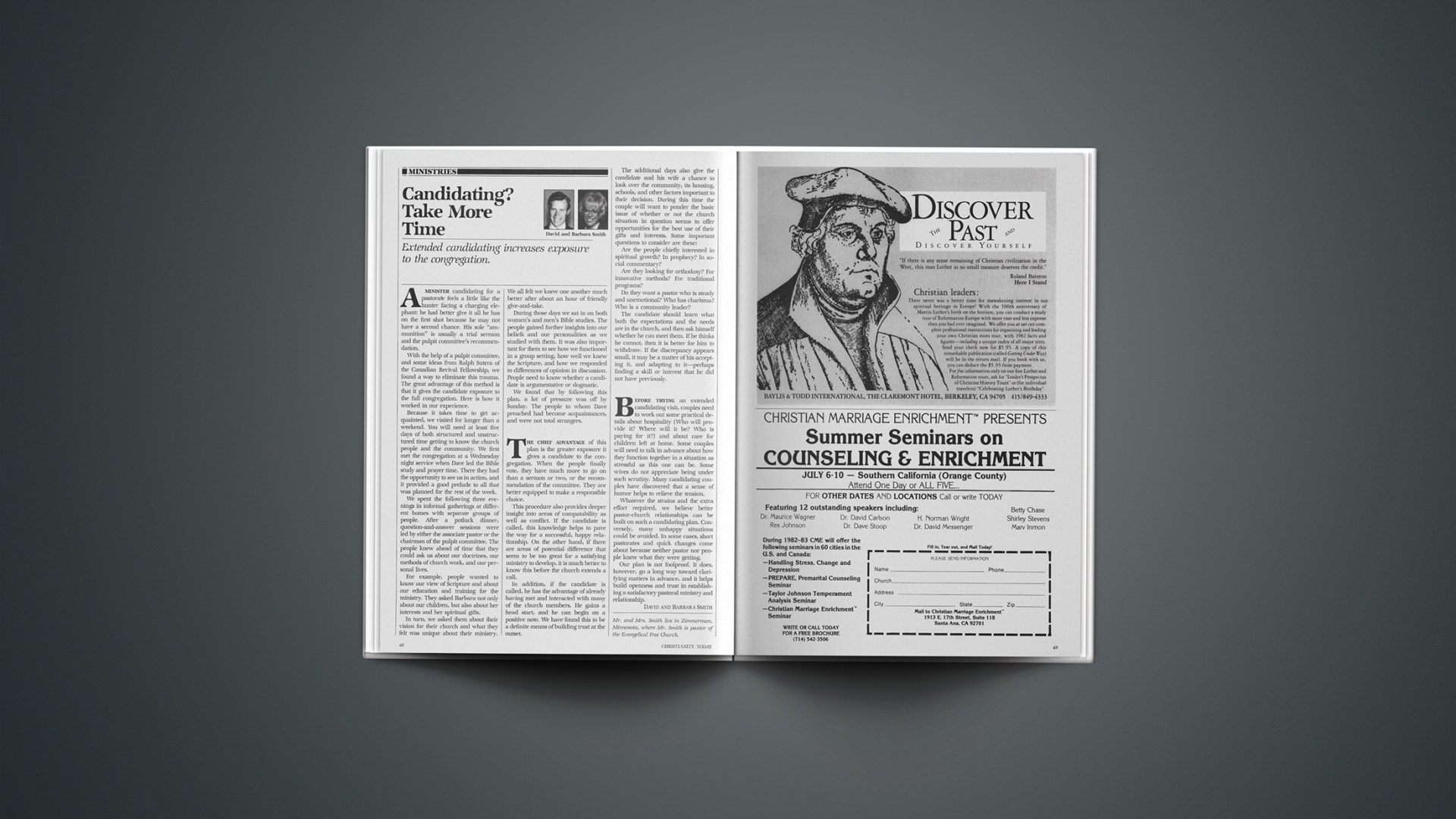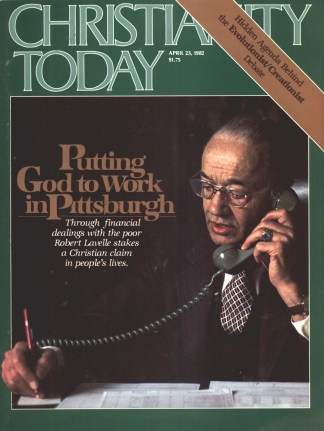Extended candidating increases exposure to the congregation.
A minister candidating for a pastorate feels a little like the hunter facing a charging elephant: he had better give it all he has on the first shot because he may not have a second chance. His sole “ammunition” is usually a trial sermon and the pulpit committee’s recommendation.
With the help of a pulpit committee, and some ideas from Ralph Sutera of the Canadian Revival Fellowship, we found a way to eliminate this trauma. The great advantage of this method is that it gives the candidate exposure to the full congregation. Here is how it worked in our experience.
Because it takes time to get acquainted, we visited for longer than a weekend. You will need at least five days of both structured and unstructured time getting to know the church people and the community. We first met the congregation at a Wednesday night service when Dave led the Bible study and prayer time. There they had the opportunity to see us in action, and it provided a good prelude to all that was planned for the rest of the week.
We spent the following three evenings in informal gatherings at different homes with separate groups of people. After a potluck dinner, question-and-answer sessions were led by either the associate pastor or the chairman of the pulpit committee. The people knew ahead of time that they could ask us about our doctrines, our methods of church work, and our personal lives.
For example, people wanted to know our view of Scripture and about our education and training for the ministry. They asked Barbara not only about our children, but also about her interests and her spiritual gifts.
In turn, we asked them about their vision for their church and what they felt was unique about their ministry. We all felt we knew one another much better after about an hour of friendly give-and-take.
During those days we sat in on both women’s and men’s Bible studies. The people gained further insights into our beliefs and our personalities as we studied with them. It was also important for them to see how we functioned in a group setting, how well we knew the Scripture, and how we responded to differences of opinion in discussion. People need to know whether a candidate is argumentative or dogmatic.
We found that by following this plan, a lot of pressure was off by Sunday. The people to whom Dave preached had become acquaintances, and were not total strangers.
The chief advantage of this plan is the greater exposure it gives a candidate to the congregation. When the people finally vote, they have much more to go on than a sermon or two, or the recommendation of the committee. They are better equipped to make a responsible choice.
This procedure also provides deeper insight into areas of compatability as well as conflict. If the candidate is called, this knowledge helps to pave the way for a successful, happy relationship. On the other hand, if there are areas of potential difference that seem to be too great for a satisfying ministry to develop, it is much better to know this before the church extends a call.
In addition, if the candidate is called, he has the advantage of already having met and interacted with many of the church members. He gains a head start, and he can begin on a positive note. We have found this to be a definite means of building trust at the outset.
The additional days also give the candidate and his wife a chance to look over the community, its housing, schools, and other factors important to their decision. During this time the couple will want to ponder the basic issue of whether or not the church situation in question seems to offer opportunities for the best use of their gifts and interests. Some important questions to consider are these:
Are the people chiefly interested in spiritual growth? In prophecy? In social commentary?
Are they looking for orthodoxy? For innovative methods? For traditional programs?
Do they want a pastor who is steady and unemotional? Who has charisma? Who is a community leader?
The candidate should learn what both the expectations and the needs are in the church, and then ask himself whether he can meet them. If he thinks he cannot, then it is better for him to withdraw. If the discrepancy appears small, it may be a matter of his accepting it, and adapting to it—perhaps finding a skill or interest that he did not have previously.
Before trying an extended candidating visit, couples need to work out some practical details about hospitality (Who will provide it? Where will it be? Who is paying for it?) and about care for children left at home. Some couples will need to talk in advance about how they function together in a situation as stressful as this one can be. Some wives do not appreciate being under such scrutiny. Many candidating couples have discovered that a sense of humor helps to relieve the tension.
Whatever the strains and the extra effort required, we believe better pastor-church relationships can be built on such a candidating plan. Conversely, many unhappy situations could be avoided. In some cases, short pastorates and quick changes come about because neither pastor nor people knew what they were getting.
Our plan is not foolproof. It does, however, go a long way toward clarifying matters in advance, and it helps build openness and trust in establishing a satisfactory pastoral ministry and relationship.
DAVID AND BARBARA SMITH
Mr. and Mrs. Smith live in Zimmerman, Minnesota, where Mr. Smith is pastor of the Evangelical Free Church.









